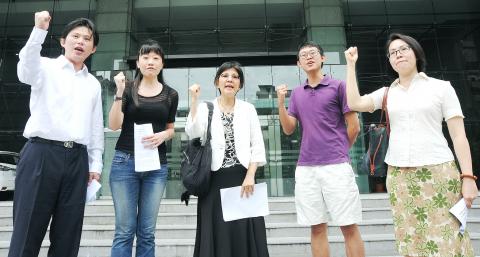Activists against media monopolization yesterday accused the Chinese Nationalist Party (KMT) of trying to fool the public by failing to honor its promise to list anti-monopoly bills among priority legislation for the extra legislative session that starts today.
“The KMT government changes its mind often, finds excuses and fools the public. It is making me extremely mad,” Academia Sinica research fellow Huang Kuo-chang (黃國昌) said during a demonstration outside the National Communications Commission’s (NCC) headquarters in Taipei.
He said that civic groups and activists were very excited when an anti-monopoly media bill proposed by the commission passed legislative committee review on May 30, with full support from commission Chairman Shih Shih-hao (石世豪), as well as KMT legislators such as Yang Li-huan (楊麗環) and Lo Shu-lei (羅淑蕾).

Photo: Liu Hsin-de, Taipei Times
“Despite having agreed in writing to make anti-monopoly media legislation a priority, the KMT made a 180 degree turn as the extra session approached, saying that passing such legislation ‘is not an urgent necessity,’” Huang said.
“The KMT should stop fooling the public and honor its promises by making anti-monopoly media legislation a priority bill,” he said.
Huang said some media outlets have attempted to influence public opinion by saying that media monopolization was a non-issue. One outlet gave the issue extensive coverage last year, but it was not mentioning it now, he said.
“I seriously question if this media outlet was serious in opposing monopolization of the media,” he said. “If it only spoke for itself out of its own interests, then what makes it different from Want Want China Times Group chairman Tsai Eng-meng (蔡衍明), whom we opposed?”
The draft should be put on the agenda for the extra session, he said, adding that the commission cannot avoid its responsibility to help push through the legislation.
“If the commission chairperson has neither the desire nor the power to continue pushing the bill at the legislature, then please step down like a responsible politician,” he said.
Flora Chang (張錦華), a journalism professor at National Taiwan University, said the arguments of the Chinese-language China Times and United Daily News that the anti-monopolization media act was unnecessary because monopolization is not an issue in Taiwan.
“It appears that [controversial] media acquisitions have temporarily ceased, but that does not mean that there will not be any large media mergers in the future,” she said.
“The arguments from the two newspapers seemed to be saying that we don’t need buildings that are fireproof and can withstand earthquakes because there are no fires or earthquakes now,” she said.
Chang said that allowing media conglomerates to acquire media outlets will only worsen the quality of TV programs, given the way that some large media groups try to boost ratings by emphasizing their crime reports.
The draft act would have facilitated the development of digital media convergence because it requires to cable TV service operators to set aside 1 percent of their revenue to establish the Media Content Diversity Development Fund, but lawmakers deleted those articles, she said.
Eve Chiu (邱家宜), executive director of the Excellent Journalism Award Foundation, said she hoped the deleted articles would be put back in the legislation in the extra session.
“This fund would help develop the nation’s media content industry,” Chiu said. “Our singers would not need to go to China to join singing contests.”
Chiu said that many Taiwanese actors are forced to look for jobs in China because the nation’s TV stations are unwilling to spend money producing dramas anymore and prefer to broadcast South Korean or Chinese shows instead.

A magnitude 6.4 earthquake struck off the coast of Hualien County in eastern Taiwan at 7pm yesterday, the Central Weather Administration (CWA) said. The epicenter of the temblor was at sea, about 69.9km south of Hualien County Hall, at a depth of 30.9km, it said. There were no immediate reports of damage resulting from the quake. The earthquake’s intensity, which gauges the actual effect of a temblor, was highest in Taitung County’s Changbin Township (長濱), where it measured 5 on Taiwan’s seven-tier intensity scale. The quake also measured an intensity of 4 in Hualien, Nantou, Chiayi, Yunlin, Changhua and Miaoli counties, as well as

Credit departments of farmers’ and fishers’ associations blocked a total of more than NT$180 million (US$6.01 million) from being lost to scams last year, National Police Agency (NPA) data showed. The Agricultural Finance Agency (AFA) said last week that staff of farmers’ and fishers’ associations’ credit departments are required to implement fraud prevention measures when they serve clients at the counter. They would ask clients about personal financial management activities whenever they suspect there might be a fraud situation, and would immediately report the incident to local authorities, which would send police officers to the site to help, it said. NPA data showed

ENERGY RESILIENCE: Although Alaska is open for investments, Taiwan is sourcing its gas from the Middle East, and the sea routes carry risks, Ho Cheng-hui said US government officials’ high-profile reception of a Taiwanese representative at the Alaska Sustainable Energy Conference indicated the emergence of an Indo-Pacific energy resilience alliance, an academic said. Presidential Office Secretary-General Pan Men-an (潘孟安) attended the conference in Alaska on Thursday last week at the invitation of the US government. Pan visited oil and gas facilities with senior US officials, including US Secretary of the Interior Doug Burgum, US Secretary of Energy Chris Wright, Alaska Governor Mike Dunleavy and US Senator Daniel Sullivan. Pan attending the conference on behalf of President William Lai (賴清德) shows a significant elevation in diplomatic representation,

The Taipei City Reserve Command yesterday initiated its first-ever 14-day recall of some of the city’s civilian service reservists, who are to undergo additional training on top of refresher courses. The command said that it rented sites in Neihu District (內湖), including the Taipei Tennis Center, for the duration of the camp to optimize tactical positioning and accommodate the size of the battalion of reservists. A battalion is made up of four companies of more than 200 reservists each, it said. Aside from shooting drills at a range in New Taipei City’s Linkou District (林口), the remainder of the training would be at